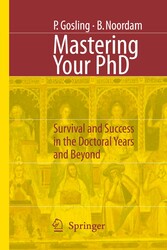
Mastering Your PhD - Survival and Success in the Doctoral Years and Beyond

von: Patricia Gosling, Lambertus D. Noordam
Springer-Verlag, 2006
ISBN: 9783540333883
Sprache: Englisch
157 Seiten, Download: 1103 KB
Format: PDF, auch als Online-Lesen
Chapter 10 Searching the Scientific Literature (p. 75-76)
The history of science knows scores of instances
where an investigator was in the possession
of all the important facts for a newtheory,
but simply failed to ask the right questions.
Ernst Mayr
Before you carry out even your .rst experiment in the lab, you would be well advised to spend some time in the library doing a thorough literature search of your research topic. Perhaps youworked on a project in this same .eld as an undergraduate, or think you are familiar with the .eld because it is related to other work you have done. Even if you have some knowledge of the literature on your project, you shouldn’t skip this step. The investment of time in the library will pay off many times over in the lab. You don’t want to risk doing work that someone else has already done, or going down the same worn path that others have traveled before you. Science is not carried out in a vacuum. It is about steady forward progress over long periods of time and wise graduate students will take the time to read and bene.t from the research .ndings of their predecessors.
As you embark on your literature search, youmay feel quickly overwhelmed by the pile of papers you accumulate, so keep in mind that is impossible to read all the research ever published in your area. Being selective about what you read is key to getting a thorough overview of a particular .eld, without drowning in too much information. But whatever you do and however you decide to go about it, do not skip this step. Youwill live to regret it.
Getting started in the library
Get comfortable with the layout of the library and with the research tools available at your institute. Introduce yourself to the reference librarian(s) and explain that you want to carry out a literature search onyour thesis topic. These individuals are great sourcesof information and are there to help you in your search. You’ll be spending a lot of time in the library so take the time to become familiar with all its services.
What kinds of scienti.c literature exist and which ones will be most important to you? Broadly speaking, scienti.c literature can be divided into two types of articles: peer-reviewed and popular. Most of the articles published in scienti.c journals, both primary (original research) and secondary (review articles) have gone through a stringent process called peer-review. Before an editor will accept a paper for publication, he/she will send it out for review to at least two experts in the .eld. The identity of the reviewers is always kept secret fromthe author so that any comments made on the manuscript will be impartial.
When the paper comes back with comments from the referees, it is the author’s responsibility to correct any errors or discrepancies in interpretation before the paper can be accepted for publication. This process,while not infallible, insures that most articles are scienti.cally sound and as free fromerror as possible. Articles published in popular scienti.c magazines are not subject to peer review, and are therefore not always reliable sources of information.
Secondary literature is published in the form of review articles. As the name suggests, these articles are often very comprehensive in nature andprovide anoverviewof the scienti.c .ndings inaparticular .eld over a particular period of time. Reviews do not present new and original data, they are compilations of other people’s work, but very often written by a big name scientist in the .eld. Review articles can be a goldmine of information andwill signi.cantly help youwith your literature search by cutting down on the amount of time you spend on searching out individual (primary) research articles.







